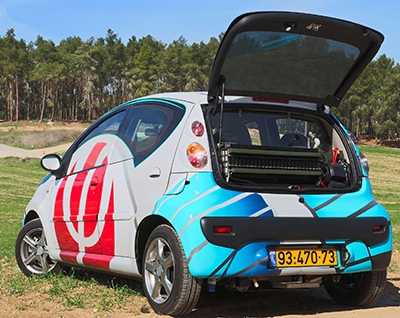Alcoa and clean technology company Phinergy have entered into a joint development agreement to further develop Phinergy’s electric vehicle batteries that run on air and aluminum. Announced at the Advanced Automotive Battery Conference in Atlanta, the companies will collaborate on new materials, processes and components to commercialize the aluminum-air battery, which can extend electric vehicle range by 1,000 miles.
“Alcoa’s extensive technical materials expertise, along with our deep roots in bringing new products to market in the automotive industry, were of great interest to Phinergy as its revolutionary aluminum-air battery moves from research to commercialization,” said Dr. Raymond Kilmer, Alcoa’s Executive Vice President and Chief Technology Officer. “Automotive manufacturers are looking for technologies that enable zero-emission cars to travel the same kinds of distances as gasoline-powered cars. The aluminum-air range extender has the potential to meet that challenge.”
“Electric vehicle adoption has been slowed by the limited range of regular batteries, causing what is commonly known as ‘range anxiety’,” said Aviv Tzidon, CEO of Phinergy. “With Phinergy’s technology, and Alcoa’s industrial leadership across both the aluminum value chain and the automotive market, we see an exciting opportunity to help move electric vehicles into the mainstream.”
Phinergy’s aluminum-air battery uses air and water to unleash energy stored in aluminum. According to Phinergy, just one of the 50 aluminum plates in the battery can power a car for approximately 20 miles, extending vehicle range by approximately 1,000 miles. The technology allows an energy density that surpasses conventional battery technologies and creates electric vehicles with travel distances, purchase prices and life-cycle costs that are comparable to fossil-fuel cars.
In addition to use in electric vehicles, Phinergy indicated that the battery technology can be used for stationary energy applications such as commercial emergency generators for hospitals and data centers, general purpose generators, and defense applications such as mobile housing and unmanned vehicles. It can also be used for first responders due to its infinite shelf life and high energy density. Phinergy and Alcoa are also working on the aluminum-air technology for these applications.
Alcoa’s team engaged on the project is based at the Alcoa Technical Center located outside of Pittsburgh, which is the largest light-metals research facility in the world.
Alcoa is a global leader in lightweight metals engineering and manufacturing, innovating multi-material solutions that advance our world. Their technologies enhance transportation, from automotive and commercial transport to air and space travel, and improve industrial and consumer electronics products. They enable smart buildings, sustainable food and beverage packaging, high-performance defense vehicles across air, land and sea, deeper oil and gas drilling and more efficient power generation. Alcoa pioneered the aluminum industry over 125 years ago, and today, their 60,000 people in 30 countries deliver value-add products made of titanium, nickel and aluminum, and produce best-in-class bauxite, alumina and primary aluminum products.
Phinergy is an innovative clean tech company developing breakthrough metal-air technologies. Benefiting from a diversity of talents and disciplines, the Phinergy team has come up with creative ways to address traditional challenges. Phinergy's aluminum-air energy system offers significant advantages over competing technologies, including: very high energy density, no polluting emissions, fully recyclable materials, safety and low cost.
Phinergy is a leading developer of breakthrough zero-emission, high energy-density systems based on metal-air energy technologies. The company’s primary focus is on aluminum-air and zinc-air batteries. Unlike conventional batteries that carry oxygen, these batteries freely breathe oxygen from the ambient air to release the energy contained in metals.
Metal-air technology has been at the forefront of energy research for years, due to its enormous energy potential. Phinergy's technological breakthroughs allow it to efficiently utilize this potential for various applications, outperforming conventional batteries.
A conventional battery consists of an anode and a cathode, where the cathode takes up to 70% of the battery’s weight. The cathode is used as a container for a reactant (e.g. Oxygen), usually up to 5% of its weight, that is required for releasing the energy in a metal anode. The result is that most of a conventional battery’s weight is poorly utilized.
A metal-air battery features an air-electrode that breathes oxygen from ambient air, instead of the conventional cathode. That is, the battery consumes the required oxygen from the air, rather than having heavy materials that bound oxygen inside it. Metal-air batteries therefore have a huge potential for delivering high capacity with low weight.
The Company’s Aluminum-Air battery system has been successfully integrated into an electric vehicle resulting in more than three times the driving range of current EVs.

04 June 2014
1000 miles with the aluminium-air battery from Alcoa/Phinergy
by

